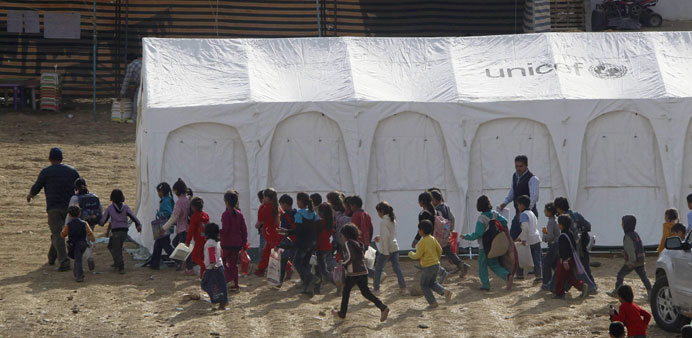|
Only weeks ago, the administration was touting an international agreement to rid Syria of its chemical weapons as a diplomatic triumph. US officials were predicting the deal would ease the way for broader peace talks in Geneva that would produce a transitional government without Bashar al-Assad and an end to the Syrian war. |
They couldn’t have been more wrong.
As I wrote then, the deal was a distraction that secured Assad’s hold on power and left him free to slaughter civilians with conventional weapons. (It also gave President Obama an excuse to renege on his promise to help non-jihadist Syrian rebels, even as Russia and Iran shower Assad with weapons and manpower.)
No wonder the Syrian dictator feels little need to compromise, and the long-awaited Geneva talks were postponed again this week. If they ever take place, it probably won’t be until 2014.
Meantime, the focus on chemical-weapons inspectors diverts international attention from the urgent need to confront a staggering humanitarian catastrophe in Syria, which is about to get much worse.
More than 100,000 people have been killed in the 2-year-old Syrian conflict, including about 40,000 civilians (fewer than 1,000 died from the regime’s sarin gas attack).
The bulk of the civilians were slaughtered in cities and towns by deliberate regime air and artillery strikes aimed at depopulating areas where Syrians opposed Assad’s rule. Let me be more specific: The regime targeted apartment buildings, mosques, schools, and especially hospitals, killing families en masse, and destroying the infrastructure for daily living. And the slaughter goes on.
Yet instead of being branded a war criminal, Assad is a full partner with Russia and the UN in implementing the chemical-weapons deal. He’s even demanding - I kid you not - that he be given armoured trucks and sophisticated communications equipment to carry out the task.
Here’s the most infuriating part of the chemical-weapons accord: If Russia (and Iran) could make Assad cough up his poison gas - and open the way for inspectors to safely visit storage sites - they clearly could make him open the way for international aid workers to deliver polio serum, food, and shelters to millions of displaced Syrians inside the country.
Yet Moscow stands ready to block any UN resolution that would compel Assad to stop targeting civilians and facilitate aid delivery. A toothless UN Security Council statement that called for Damascus to expedite aid has been virtually ignored.
And so Syria’s humanitarian tragedy worsens. Of 23mn Syrians, more than 2mn have become refugees in, and a burden on, neighbouring Turkey, Iraq, Lebanon and Jordan. Many refugees are living in terrible squalour and are unprepared to survive another harsh winter.
In Lebanon alone, there are 800,000 refugees - in a country with a population of four million. (That’s the equivalent of 75mn refugees descending within two years on US shores.) This influx is badly straining Lebanon’s resources and threatening to tear apart its social fabric. But the refugees keep coming. That’s because the situation inside Syria is even more dire.
As Secretary of State John Kerry wrote in ForeignPolicy.com, Assad is waging “a war of starvation” against his people. Last week, UN humanitarian chief Valerie Amos told the UN Security Council that about 40% of all Syrians need humanitarian aid, and 6.5mn are homeless refugees within their own country.
Kerry denounced “the systematic (regime) denial of medical assistance, food supplies, and other humanitarian aid to huge proportions of the population”. While rebel groups and criminals hinder aid delivery in some areas, the bulk of the blame falls on the regime, which has repeatedly thwarted efforts by international aid agencies to deliver food and medicine to civilians in rebel-controlled areas.
Cases of children dying of starvation are being reported in what was once a middle-class country. As if to prove how much worse things could become, there has been a small outbreak of polio in a rebel-controlled area, which could explode into an epidemic unless hundreds of thousands of children are vaccinated. Health officials say the confirmed cases are only the tip of the iceberg.
As the International Rescue Committee’s president, David Miliband, wrote in frustration, “It is outrageous that in the 21st century vulnerable Syrians now risk being afflicted with polio”. But even such outrage may not move the world to action. One need only read Kerry’s entire op-ed to understand why.
Kerry makes clear that- beyond a generous US commitment of $1.4bn in humanitarian aid - the US will take no further action to pressure Assad. He calls on “Assad’s allies” - Russia and Iran - to pressure the dictator and cites the chemical-weapons deal as proof that this could happen. Surely he knows this is a pipe dream.
“The world can’t sit idly by watching innocents die,” says Kerry. Not so.
♦ Trudy Rubin may be contacted by e-mail at: [email protected]

